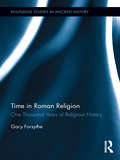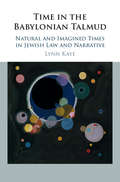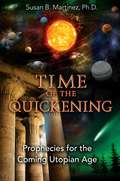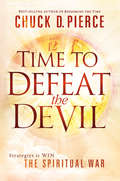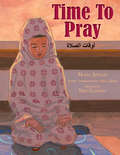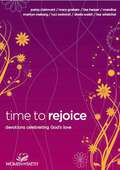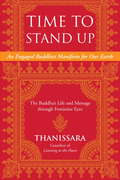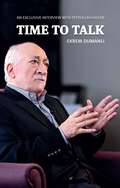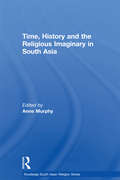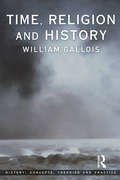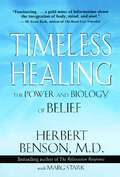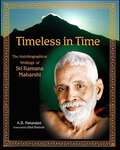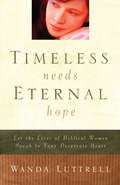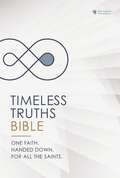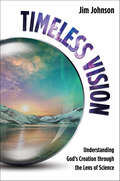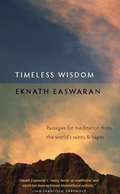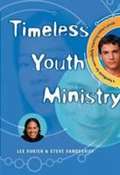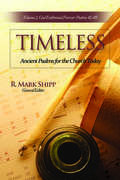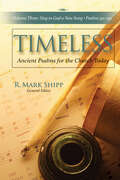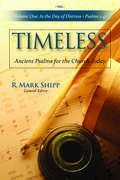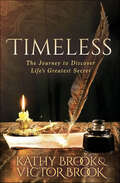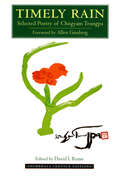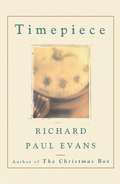- Table View
- List View
Time in Roman Religion: One Thousand Years of Religious History (Routledge Studies in Ancient History)
by Gary ForsytheReligion is a major subfield of ancient history and classical studies, and Roman religion in particular is usually studied today by experts in two rather distinct halves: the religion of the Roman Republic, covering the fifth through first centuries B.C.; and the religious diversity of the Roman Empire, spanning the first four centuries of our era. In Time in Roman Religion, author Gary Forsythe examines both the religious history of the Republic and the religious history of the Empire. These six studies are unified by the important role played by various concepts of time in Roman religious thought and practice. Previous modern studies of early Roman religion in Republican times have discussed how the placement of religious ceremonies in the calendar was determined by their relevance to agricultural or military patterns of early Roman life, but modern scholars have failed to recognize that many aspects of Roman religious thought and behavior in later times were also preconditioned or even substantially influenced by concepts of time basic to earlier Roman religious history. This book is not a comprehensive survey of all major aspects of Roman religious history spanning one thousand years. Rather, it is a collection of six studies that are bound together by a single analytical theme: namely, time. Yet, in the process of delving into these six different topics the study surveys a large portion of Roman religious history in a representative fashion, from earliest times to the end of the ancient world and the triumph of Christianity.
Time in the Babylonian Talmud: Natural and Imagined Times in Jewish Law and Narrative
by Lynn KayeIn this book, Lynn Kaye examines how rabbis of late antiquity thought about time through their legal reasoning and storytelling, and what these insights mean for thinking about time today. <P><P>Providing close readings of legal and narrative texts in the Babylonian Talmud, she compares temporal ideas with related concepts in ancient and modern philosophical texts and in religious traditions from late antique Mesopotamia. Kaye demonstrates that temporal flexibility in the Babylonian Talmud is a means of exploring and resolving legal uncertainties, as well as a tool to tell stories that convey ideas effectively and dramatically. Her book, the first on time in the Talmud, makes accessible complex legal texts and philosophical ideas. It also connects the literature of late antique Judaism with broader theological and philosophical debates about time. Introduces a new method for studying concepts in Talmudic texts, helping others conduct conceptual research in rabbinic and other late antique legal literatures; Connects literature of late antique Judaism with broader theoretical, theological and philosophical debates about time, appealing to readers who are interested in time but are not rabbinic literature specialists; Clarifies complex Hebrew and Aramaic source material, making texts that are understood by relatively few experts more accessible.
Time of the Quickening: Prophecies for the Coming Utopian Age
by Susan B. MartinezA guide to the science of prophecy, why so many predictions never come to pass, and the Golden Age ahead • Presents a mathematical means of divining the future, revealed in the Oahspe Bible, using the Egyptian Tables of Destiny, a 12,000-year-old system so exact it can foretell every day of the year • Reveals that we are not headed for Rapture and the Apocalypse but for “the Quickening,” the embryonic stage of a Utopian Age • Examines the cycles of history and explains why many prophecies have not come true Reviewing the cycles of history from biblical times to the present and prophecies of the future from Nostradamus to Edgar Cayce and Jeane Dixon, Susan B. Martinez reveals that our current “time of troubles” is not the beginning of Rapture, the Apocalypse, or Armageddon, but of the embryonic stage of a Utopian Age--the “Quickening” of the human race. Reviving the lost science of prophecy, Martinez explains why so many “great prophecies” have failed and presents the 12,000-year-old Egyptian system of prediction so exact it can foretell every day of the year, a method based not on the planets, astrology, or intuition but on Earth’s magnetic rhythms. Using Earth science, historical research, religious texts, spiritualism, and patterns within the cycles of war and political milestones, she demonstrates that the past is the hidden key to the future and uncovers the prophetic numbers of Earth’s cycles--11, 33, 99, and 363--as set forth in the Egyptian Tables of Destiny, ancient texts brought to light by the 19th-century Oahspe Bible. Explaining how readers can use the Tables of Destiny to make their own predictions of the future, she presents her own forecasts of the risks and costs of technological progress, the destiny of America, the up-and-coming global religion, the truth behind climate change and the cause of earthquakes, and the true life expectancy of planet Earth as well as offering a preview of the Paradigm Shift and Golden Age ahead, a time of global unity and awakening of the soul of the world.
Time of the Singing of Birds (Grace Livingston Hill Series #23)
by Grace Livingston HillYoung Lieutenant Vance returned home to find his old gang tainted with worldliness. Then one untarnished jewel of a girl sparkled his future with honesty and innocence, bringing him the priceless gift of love with [Christian] faith." In addition, Barney Vance is concerned about his war buddy, Stormy Applegate. Find out whether Stormy survives the war and finds happiness like Barney.
Time to Defeat the Devil: Strategies to Win the Spiritual War
by Chuck D. PierceTimes are changing, and we must stay in God’s timing to prosper in a world where the god of this age is attempting to mold you into the blueprint of the day and cause you to look like the world around you. God has called His people to have transformed minds and to be linked to the Head--not to bring up the rear in producing the changes around us. When we are at the right place at the right time, we can break out of confusing, mind-altering powers that war against God and all the blessings He is ready to pour upon us. The author is writing this book to help us understand how to enter a new level of freedom and victory. This book is like a war manual that will help you stay free from the enemy’s vexing power as you journey through life. This installment of the Time trilogy will teach you how to war in time. Your battles are now! God reconciles our past so that our now opens up to our future. Your defeats in a former season will now become the victories and triumphs for your future.
Time to Pray
by Maha AddasiA visit with Grandmother in the Middle East is always special for Yasmin, but this time it is even more so in this picture book about faith and family.On her first night visiting her grandmother, Yasmin is wakened by the muezzin at the nearby mosque calling the faithful to prayer. She watches from her bed as her grandmother prepares to pray. During her stay, Yasmin's grandmother makes her prayer clothes, buys her a prayer rug, and teaches her the five prayers that Muslims perform over the course of a day. When it's time for Yasmin to board a plane and return home, her grandmother gives her a present. When Yasmin opens the present when she gets home, she discovers a prayer clock in the shape of a mosque, with an alarm that sounds like a muezzin calling the faithful to prayer.Maha Addasi's warm and endearing story, richly illustrated by Ned Gannon, is the recipient of an Arab American Book Award, Honor Book. Featuring text both in English and Arabic, this is a perfect title for children learning more about Middle Eastern cultures and language.
Time to Rejoice: Devotions Celebrating God's Love
by Women Of FaithIf you could spend a day swapping stories with Patsy Clairmont, Mary Graham, Lisa Harper, Mandisa, Marilyn Meberg, Luci Swindoll, Sheila Walsh, and Lisa Whelchel, these are the stories you would hear. They're stories of hope . . . redemption . . . and God's unfathomable love. And since these women love to laugh, you'll also find hilarious true-life tales of things that didn't go exactly as planned--at least, not the way they planned. (God may have planned it that way all along!) Whenever you need an "encouragement break," dip into this collection of inspirational and heartwarming stories. Because any time is a good Time to Rejoice.
Time to Stand Up
by ThanissaraTime to Stand Up retells the story of the historical Buddha, one of the greatest sacred activists of all time, as a practical human being whose teachings of freedom from suffering are more relevant than ever in this time of global peril. Evolving onward from the patriarchal template of spiritual warriors and their quests, former nun Thanissara explores awakening from within a feminine view where the archetypes of lover and nurturer are placed as central and essential for a sustainable world.Vital is an investigation into the pinnacle of Buddhist practice, the realization of the "liberated heart." Thanissara questions the narrative of "transcendence" and invites us into the lived reality of our deepest heart as it guides our journey of healing, reclamation, and redemption. As the book unfolds, the author examines traditional Buddhism--often fraught with gender discrimination--and asks the important question, "Can Buddhist schools, overly attached to hierarchal power structures, and often divorced from the radical and free inquiry exemplified by the Buddha, truly offer the ground for maturing awakening without undertaking a fundamental review of their own shadows?"Chapter by chapter, the book relates Siddhartha Gautama's awakening to the sea-change occurring on Earth in present time as we as a civilization become aware of the ethical bankruptcy of the nuclear and fossil fuel industry and the psychopathic corporate and military abuse of power currently terrorizing our planet. Thanissara relates the Buddha's story to real-life individuals who are living through these transitional times, such as Iraq war veterans, First Nation People, and the Dalai Lama. Time to Stand Up gives examples of the Buddha's activism, such as challenging a racist caste system and violence against animals, stopping war, transforming a serial killer, and laying down a nonhierarchical structure of community governance, actions that would seem radical even today.Thanissara explores ways forward, deepening our understanding of meditation and mindfulness, probing its use to pacify ourselves as the cogs in the corporate world by helping people be more functional in a dysfunctional systems--and shows how these core Buddhist practices can inspire a wake-up call for action for our sick and suffering planet Earth.About the Sacred Activism seriesWhen the joy of compassionate service is combined with the pragmatic drive to transform all existing economic, social, and political institutions, a radical divine force is born: Sacred Activism. The Sacred Activism Series, published by North Atlantic Books, presents leading voices that embody the tenets of Sacred Activism--compassion, service, and sacred consciousness--while addressing the crucial issues of our time and inspiring radical action.
Time to Talk about Dying: How Clergy and Chaplains Can Help Senior Adults Prepare for a Good Death
by Fred GrewePresenting clergy and chaplains with unique therapeutic tools for helping senior adults enrich their later years, this book gives advice on how to strengthen relationships, find meaning in life and feel comfortable approaching life's final chapter. It guides clergy and chaplains through how to effectively conduct "Soul Legacy" projects, in which older people reflect on what they want to leave behind for their loved ones and how they want to be remembered after they die. It enables older people to pay loved ones personal tributes and show them how important they are. By focusing on others rather than the self, it provides comfort for loved ones as well as the senior adult, prevents loneliness and negative feelings about ageing, and helps adults gradually become comfortable with the challenges of approaching the end of life.
Time to Talk: An Exclusive Interview with Fethullah Gulen
by Ekrem DumanliTime to Talk , a detailed interview of Fethullah Gulen by Ekrem Dumanli, is a defense manifesto of the Hizmet Movement which has been engaged in educational activities around the world and in Turkey for five decades. The content of the talk once again confirms that the Movement, which has never been involved in any illegal activity whatsoever since its inception, expects nothing but the establishment of bridges of peace and brotherhood throughout the world. Gulen's responses to the questions on the association of the Hizmet Movement with the so-called "parallel state," the December 17 corruption investigation and many other critical inquiries eliminate the suspicions.
Time, History and the Religious Imaginary in South Asia (Routledge South Asian Religion Series)
by Anne Murphy Sagarika DuttReligious imaginary is a way of conceiving and structuring the world within the conceptual and imaginative traditions of the religious. Using religious imaginary as a reference, this book analyses temporal ideologies and expressions of historicity in South Asia in the early modern, pre-colonial and early colonial period. Chapters explore the multiple understandings of time and the past that informed the historical imagination in various kinds of literary representations, including historiographical and literary texts, hagiography, and religious canonical literature. The book addresses the contributing forces and comparative implications of the formation of religious and communitarian sensibilities as expressed through the imagination of the past, and suggests how these relate to each other within and across traditions in South Asia. By bringing diverse materials together, this book presents new commonalities and distinctions that inform a larger understanding of how religion and other cultural formations impinge on the concept of temporality, and the representation of it as history.
Time, Religion and History (History: Concepts,Theories and Practice)
by William GalloisWhat is time? How does our sense of time lead us to approach the world? How did the peoples of the past view time? This book answers these questions through an investigation of the cultures of time in Christianity, Islam, Buddhism, Judaism and the Australian Dreamtime. It argues that our contemporary world is blind as to the significance and complexity of time, preferring to believe that time is 'natural' and unchanging. This is of critical importance to historians since the base matter of their study is time, yet there is almost no theoretical literature on time in history.This book offers the first detailed historiographical study of the centrality of time to human cultures. It sets out the complex ways in which ideas of time developed in the major world religions, and the manner in which such conceptions led people both to live in ways very different to our contemporary world and to make very different kinds of 'histories'. It goes on to argue that modern scientific descriptions of time, such as Einstein's Theory of Relativity, lie much closer to the complex understandings of time in religions such as Christianity than they do to our 'common-sense' notions of time which are centred on progress through a past, present and future.
Timeless Healing: The Power and Biology of Belief
by Herbert BensonLearn how the mind shapes the body, and take charge of your health and wellness with the science and power of belief.In this life-changing book, Dr. Herbert Benson draws on his twenty-five years as a physician and researcher to reveal how affirming beliefs, particularly belief in a higher power, make an important contribution to our physical health. We are not simply nourished by meditation and prayer, but are, in essence, "wired for God." Combining the wisdom of modem medicine and of age-old faith. Dr. Benson shows how anyone can, with the aid of a caring physician or healer, use their beliefs and other self-care methods to heal over 60 percent of medical problems. As practical as it is spiritual, Timeless Healing is a blueprint for healing and transforming your life.
Timeless In Time: Sri Ramana Maharshi
by A. R. NatarajanA beautifully illustrated book on the life and message of Sri Ramana Maharshi, an Indian saint of recent times, Timeless in Time explores the life of this beloved holy man.
Timeless Needs, Eternal Hope
by Wanda LuttrellThis captivating book will afford its women readers an authentic and relevant understanding of their ancient counterparts. By vividly and honestly presenting biblical women through the use of both fiction and non-fiction segments, Wanda Luttrell shows the relevance of their ancient stories to life of the 21st century woman.From this you will draw powerful real life applications that will provide insight into your life.
Timeless Truths Bible: One faith. Handed down. For all the saints. (NET)
by Thomas NelsonBe anchored in the faith &“once for all entrusted to the saints&” (Jude v. 3) with timeless wisdom shared from church history.The Christian faith is founded upon unchanging, timeless truth. From the days of the early church until the day of Christ&’s return, all of Christianity proclaims that &“Jesus Christ is Lord to the glory of God the Father&” (Philippians 2:11). This is our unchanging and unceasing confession upon which all our hope and all our joy rests.The Timeless Truths Bible will encourage you through the always timely wisdom of those who came before us. Devotional notes and commentary from trusted theologians and pastors from the second century up to the twentieth will stir your affections. The ancient creeds and confessions of the faith will grow your understanding of what we believe—and have always believed. And artwork created throughout the history of Christianity will deepen your worship of the one we call Lord.Features include: The complete text of Scripture in the New English TranslationMargin notes featuring devotional and theological commentary from notable figures throughout church history including Irenaeus, Justin Martyr, Augustine, Martin Luther, Ulrich Zwingli, Origen, John Wesley, Charles Spurgeon, John Bunyan, and John Calvin.Forty-six full-page biographies of church leadersThe complete text of some of the creeds and confessions of the Christian faith that have shaped our beliefs for generations, including:The Apostles' CreedThe Nicene CreedThe Chalcedonian DefinitionThe Athanasian CreedThe Augsburg ConfessionThe Belgic ConfessionThe Westminster CatechismThe Lausanne CovenantBook introductions for every book of the BibleLine-matched, single-column typesettingClear and readable 9-point NET Comfort Print
Timeless Vision: Understanding God's Creation through the Lens of Science
by Jim JohnsonFaith and facts are reconciled in this revelatory examination of biblical and secular truths that follows the path to God through science, not around it. Always a man of science, Jim Johnson accepted Christ into his life shortly after his fiftieth birthday. This acceptance of God&’s unseeable power did not shake his belief in science—it strengthened it. Through years of research on the world&’s evolution, Johnson found that in studying every new hypothesis and theory, he believes even more in God&’s universal role.Timeless Vision: Understanding God&’s Creation through the Lens of Science bridges the gap between faith and science. Johnson examines the natural progression of Earth&’s creation alongside the seven biblical days, explains the conundrum of time, and expands upon the ever-evolving relationship humanity has with science and religion. Through analyzing scripture with detailed data and using science to bolster Christian beliefs, Johnson reveals just how rare and privileged Earth and human life truly are. It is through studying science and faith together, not apart, that we can see how God&’s plan was developed and why He did it. One is not complete without the other. Let Johnson lead you down the path less traveled—the one of science and faith—and show how God gave humanity these ways to discover Him more fully and completely.
Timeless Wisdom
by Eknath EaswaranTimeless Wisdom is the companion volume to Eknath Easwaran's Passage Meditation. Passage Meditation gives Easwaran's instructions in his method of meditation; Timeless Wisdom is his accompanying collection of texts that are suitable for study and meditation. In this selection from the great spiritual traditions, Eknath Easwaran brings the world's timeless wisdom within reach of the modern seeker. These passages include flashes of insight from the Hindu Upanishads, heartfelt prayers of the Christian saints, the passionate songs of the Sufis, and thoughtful teachings from the Jewish, Buddhist, and Taoist traditions. An authority on world mysticism, and outstanding translator of the Indian classics, Easwaran chooses texts that are positive, practical, and meaningful for readers today. This anthology is a compact version of Easwaran's God Makes the Rivers to Flow, with a new preface and some new texts. This is a book to read and reread, each time drawing more from the well of inspiration in its pages.
Timeless Youth Ministry: A Handbook for Successfully Reaching Today's Youth
by Steve Vandegriff Lee VukichMost adults feel uncomfortable in the teen subculture. From this uneasy position, adults like to 'handle' the teens like children because they are threatening. The purpose of Timeless Youth Ministry is to help people in the church and Christian youth organizations minister to teenagers. As former youth pastors and current professors of youth ministry, the authors have 'been there, done that' in this field. They've run programs, camps, and ministry trips in such diverse places as southern California, east Tennessee, northeast Ohio and Alberta, Canada, to name a few. This book is a needed resource to examine afresh what it means to be an adolescent in today's culture and how those who minister to young people can best reach them.
Timeless, Volume 2: Ancient Psalms for the Church Today, vol. 2
by R. Mark ShippA "Psalter/Commentary" combining in-depth study of Psalms 42-89 with over a hundred new songs based on the text of these psalms.This volume, encompassing Psalms 42-89 (books two and three of the book of Psalms), is the second of three projected volumes. Volume one covered book one of Psalms (1-41), and volume three will incorporate books four and five of the Psalter (90-150). The intent of this series is not to produce technical volumes. rather, they are intended for use by church leaders, ministers, informed lay persons, and bible teachers to obtain basic understanding of some of the concerns and issues found in a particular Psalm, and go from there to an application of the Psalm for present-day worship in song.For each psalm there is a translation, treatment of its structure and theology, and then two to four musical settings: a "traditional" hymn setting and a "contemporary" setting and sometimes also a verbatim chant. This variety demonstrates several ways of bringing the Psalms into Christian worship. Most of the music in timeless is intended for congregational singing.Timeless is an ecumenical and international project. While having its origin in the a cappella tradition of Churches of Christ, the book is based on the conviction that all Christian communions share the original hymnbook of the second temple and the church. The editor, therefore, has solicited commentaries, compositions, and lyrics from a broad range of Christian traditions.
Timeless--Ancient Psalms for the Church Today, Volume Three: Sing to God a New Song, Psalms 90-150 (Timeless--Ancient Psalms for the Church Today #3)
by Mark R. ShippA Psalter/Commentary combining in-depth study of Psalms 90–150 with 140 new songs. This volume, encompassing Psalms 90–150, is the final volume of the series. Volume one covered Psalms 1–41, and volume two incorporated Psalms 42–89. The intent of this series is not to produce technical volumes; rather, they are intended for use by church leaders, ministers, informed lay persons, and Bible teachers to obtain basic understanding of some of the concerns and issues found in a particular psalm, and go from there to an application of the psalm for present-day worship in song. For each psalm there is a translation, treatment of its structure and theology, and then two or more musical settings. This variety demonstrates several ways of bringing the Psalms into Christian worship. Most of the music in Timeless is intended for congregational singing. Timeless is an ecumenical and international project. While having its origin in the a cappella tradition of Churches of Christ, the book is based on the conviction that all Christian communions share the original hymnbook of the second temple and the church. The editor, therefore, has solicited commentaries, compositions, and lyrics from a broad range of Christian traditions.
Timeless: Ancient Psalms for the Church Today (Volume One: In the Day of Distress, Psalms 1-41)
by R. Mark ShippA “Psalter/Commentary” combining in-depth study of Psalms 1–41 with 108 new songs based on the text of these psalms.This volume, encompassing Psalms 1–41 (“book one” of the book of Psalms), is the first of three projected volumes. Volume two will incorporate books two and three of Psalms (42–89), and volume three will incorporate books four and five of the Psalter (90–150). This series is intended for use by church leaders, ministers, informed lay persons, and Bible teachers to obtain basic understanding of some of the concerns and issues found in aparticular psalm, and then to use the psalm for present-day worship in song.For each psalm there is a translation, treatment of its structure and theology, and then two to four musical settings: a “traditional” hymn setting and a “contemporary” setting, and sometimes also a verbatim chant. This variety demonstrates several ways of bringing the Psalms into Christian worship. With two or three exceptions, all of these metrical psalms are new compositions for Timeless. Most of the music in Timeless is intended for the average congregation to sing.Timeless is an ecumenical and international project. While having its origin in the a cappella tradition of Churches of Christ, the book is based on the conviction that all Christian communions share the original hymnbook of the second temple and the church. The editor, therefore, has solicited commentaries, compositions, and lyrics from Methodists, Presbyterians, Baptists, Pentecostals, Roman Catholics, and others.
Timeless: The Journey to Life’s Greatest Secret
by Kathy BrookIn this allegorical journey, a traveler sets out on an expedition to discover life’s greatest secret.The nature of time is an age-old question that has been pondered by mankind for centuries, leading to many a quest for the illusive fountain of youth. What is time? How is it measured? Can we affect time? How can it be optimized for people to fulfill their life’s purpose? In Timeless, Kathy and Victor Brook blend elements of reality, fantasy, history, spirituality, and science to take readers on one traveler’s journey covering the four corners of the earth, armed with an unquenchable thirst for destiny’s call to understand the truth of human experience. Told in first-person narration, readers watch the traveler’s evolution as he discovers ancient artifacts and allows them to guide his journey and take him through lessons from ancient civilizations. Young and old alike hold their breath with the traveler at each stage of his journey as he moves closer to unveiling life’s greatest secret—and cascading through time.
Timely Rain
by Chogyam TrungpaNewly selected poetry from previously published and unpublished works, Timely Rain is the definitive edition of poems and sacred songs of the renowned Tibetan meditation master.
Timepiece (Christmas Box #2)
by Richard Paul Evans"Of all, clockmakers and morticians should bear the keenest sense of priority-their lives daily spent in observance of the unflagging procession of time... and the end thereof."-DAVID PARKIN'S DIARY. JANUARY 3, 1901 So begins Timepiece, the unforgettable story of hope and the source of the wisdom MaryAnne Parkin shared with Richard in The Christmas Box. With the help of David Parkin's diary, Richard discovers the mystery of the timepiece and the significance of MaryAnne's request.Nineteen years previous, only eleven days before her death, MaryAnne Parkin had bequeathed a beautiful rose-gold timepiece to my keeping."The day before you give Jenna away," she had said, her voice trembling as she handed me the heirloom, "give this to her for the gift."I was puzzled by her choice of words."Her wedding gift?" I asked.She looked at me sadly, then forced a fragile smile."You will know what I mean."
